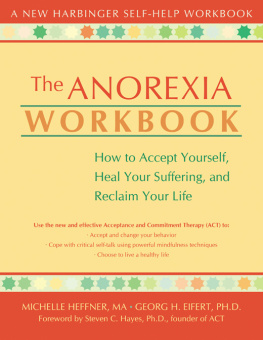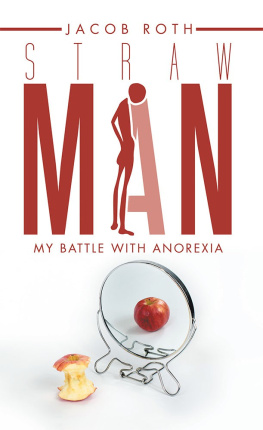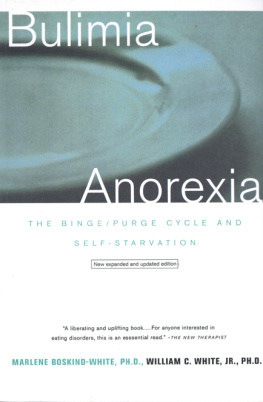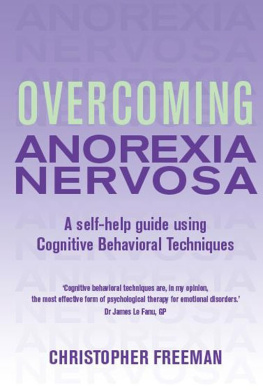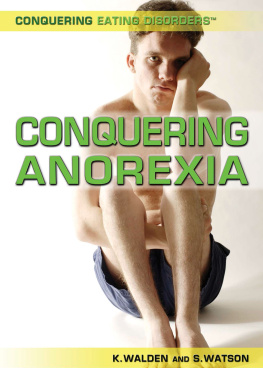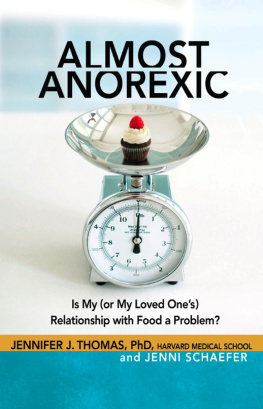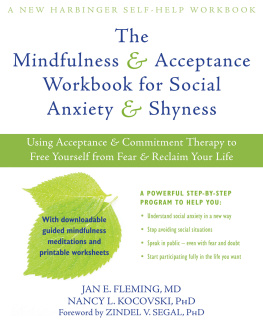Michelle Heffner Macera - The Anorexia Workbook: How to Accept Yourself, Heal Your Suffering, and Reclaim Your Life
Here you can read online Michelle Heffner Macera - The Anorexia Workbook: How to Accept Yourself, Heal Your Suffering, and Reclaim Your Life full text of the book (entire story) in english for free. Download pdf and epub, get meaning, cover and reviews about this ebook. year: 2004, publisher: New Harbinger Publications, genre: Home and family. Description of the work, (preface) as well as reviews are available. Best literature library LitArk.com created for fans of good reading and offers a wide selection of genres:
Romance novel
Science fiction
Adventure
Detective
Science
History
Home and family
Prose
Art
Politics
Computer
Non-fiction
Religion
Business
Children
Humor
Choose a favorite category and find really read worthwhile books. Enjoy immersion in the world of imagination, feel the emotions of the characters or learn something new for yourself, make an fascinating discovery.
- Book:The Anorexia Workbook: How to Accept Yourself, Heal Your Suffering, and Reclaim Your Life
- Author:
- Publisher:New Harbinger Publications
- Genre:
- Year:2004
- Rating:3 / 5
- Favourites:Add to favourites
- Your mark:
The Anorexia Workbook: How to Accept Yourself, Heal Your Suffering, and Reclaim Your Life: summary, description and annotation
We offer to read an annotation, description, summary or preface (depends on what the author of the book "The Anorexia Workbook: How to Accept Yourself, Heal Your Suffering, and Reclaim Your Life" wrote himself). If you haven't found the necessary information about the book — write in the comments, we will try to find it.
Statistics suggests that as many as 2.5 percent of American women suffer from anorexia; of these, further research indicates that one in ten of these will die from the disorder. This is the only book available that addresses the particular needs of anorexics with the techniques of acceptance and commitment therapy (ACT), a revolutionary new psychotherapy. The authors of this book are pioneering researchers in the field of ACT, with numerous research articles to their credit
Despite ever-widening media attention and public awareness of the problem, American women continue to suffer from anorexia nervosa in greater numbers than ever before. This severe psychophysiological condition-characterized by an abnormal fear of becoming obese, a persistent unwillingness to eat, and severe compulsion to lose weight-is particularly difficult to treat, often because the victims are unwilling to seek help. The Anorexia Workbook demonstrates that efforts to control and stop anorexia may do more harm than good. Instead of focusing efforts on judging impulses associated with the disorder as bad or negative, this approach encourages sufferers to mindfully observe these feelings without reacting to them in a self-destructive way. Guided by this more compassionate, more receptive frame of mind, the book coaches you to employ various acceptance-based coping strategies.
Structured in a logical, step-by-step progression of exercises, the workbook first focuses on providing you with a new understanding of anorexia and the ways you might have already tried to control the problem. Then the book progresses through techniques that teach how to use mindfulness to deal with out-of-control thoughts and feelings, how to identify choices that lead to better heath and quality of life, and how to redirect the energy formerly spent on weight loss into actions that will heal the body and mind. Although this book is written specifically as self-help for anorexia sufferers, it includes a clear and informative chapter on when you need to seek professional treatment as well as advice on what to look for in a therapist.
Michelle Heffner Macera: author's other books
Who wrote The Anorexia Workbook: How to Accept Yourself, Heal Your Suffering, and Reclaim Your Life? Find out the surname, the name of the author of the book and a list of all author's works by series.

